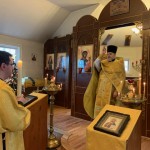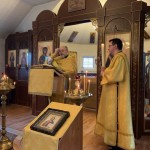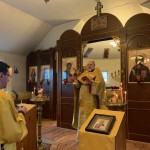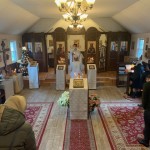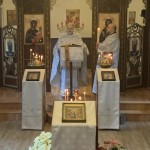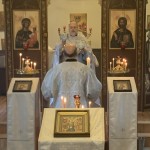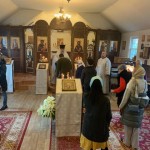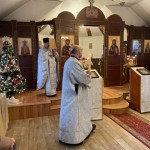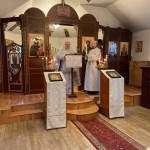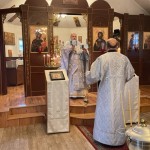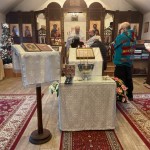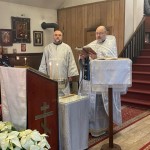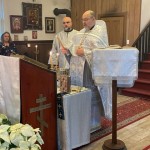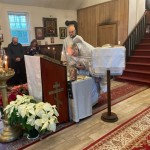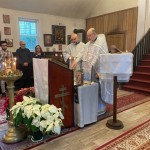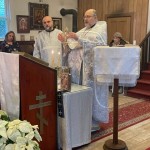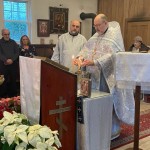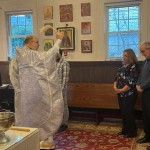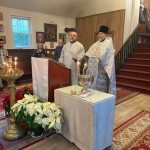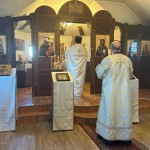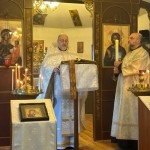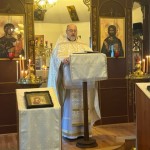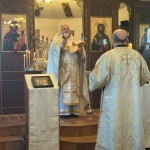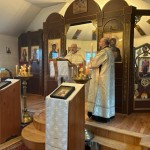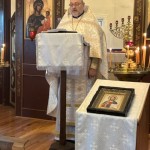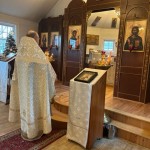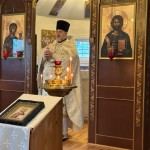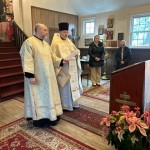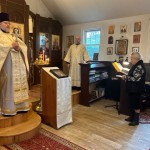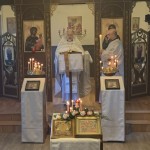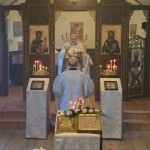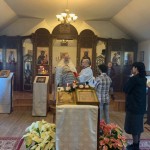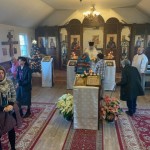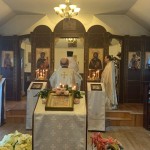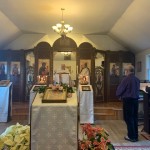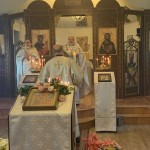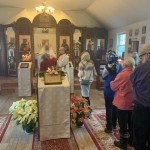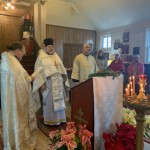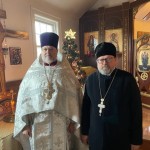On January 29, on the 33rd Sunday after Pentecost, we had a nice celebration at our St. George Church. Our Rector, Archpriest Igor Tarasov headed the Divine Liturgy. After the Gospel lesson he preached the following homily:
“Dear brothers and sisters in Christ! In four weeks we will start Lent, and the Church wishes to prepare us in advance for that important spiritual time. Today we hear the Gospel reading about a man named Zacchaeus (Lk. 19, 1-9). It describes an encounter in the life of Zacchaeus that changed the whole direction of his life. It was the day he met Jesus face to face. The whole Gospel is expressed it that encounter, for it made Zacchaeus a new and redeemed man. Tradition tells us that he later became a follower of Christ, and Bishop of Ceasarea”.
“One day Jesus was passing through Jericho. Zacchaeus, the chief tax collector, sought to see who Jesus was, but could not because of the crowd and the shortness of his stature. So he climbed a tree to get to see Him. It was much more than curiosity that made Zacchaeus climb the tree. It was a strong desire to find God in Jesus. Zacchaeus was restless. He was probably fed up with himself, fed up with the kind of life he was living. Restlessness has always been one of the signs of man’s searching for God. As St. Augustine said, “Thou hast made us for Thyself, o Lord, and our hearts are restless till they find their rest in Thee””.
“So, Zacchaeus climbed the tree and was looking for Jesus. Here we have to say that Zacchaeus was up a tree in more than one way. He was a dishonest tax collector considered a traitor by his own people because he collected taxes for the hated Romans. He had lost his self-respect. He had cut himself off from God and man. He was alone on that tree. It was a symbolic tree of his moral failure. Many of us find themselves in such a position, on a tree of our moral failure and lacking courage to come down from that tree. But God sent Jesus, His Son, into the world to invite us to come down. This is the great wonder of God’s love that Zacchaeus experienced when he discovered that he was seeking God and God was also seeking him”.
“The Gospel says that when Jesus came to the place, He stopped, looked up right into the tree, right at Zacchaeus, and the eyes of the two men met. Zacchaeus heard Jesus calling him by name and saying, “Make haste and come down; for I must stay at your house” (Lk. 19, 5). Long time ago when King George of England came to some British city, many people lined the streets to see their monarch. After the procession had ended, a small boy was weeping bitterly. Someone asked him, “Why are you crying? Didn’t you see the king?” “Oh,” the boy sobbed, “I saw the king, but he didn’t see me!” What a comfort to know that it is not only we who see our great King, but that He sees us and responds to our needs”.
“Jesus saw Zacchaeus, He noticed him and desired to bless his home. And it did happen because Zacchaeus, being a sinner, desired to find God and to change his life. He even performed some labor to climb the tree”.
“Dear brothers and sisters! Like Zacchaeus, we will never see Jesus if we remain on the level we are. There are too many persons and things standing in our way. We must climb higher. Fortunately, there are trees we too can climb to help us see Jesus. There is the tree of prayer. Prayer is speaking with Jesus just as really as Zacchaeus did. If we are to see Jesus, to make Him present in our lives, we must climb the tree of prayer. There is the tree of the Sacred Scripture. If we read or listen to it, God speaks to us. There is the tree of repentance. Zacchaeus did repent, and Jesus blessed him and his house. There is the tree of the Holy Sacraments. If we receive them, Jesus blesses us and unites with us”.
“Therefore, dear brothers and sisters, we do not need to climb a sycamore tree to see Jesus today. There are other symbolic trees we can climb: the trees of prayer, of the Scripture, of repentance, of Sacraments, of other pious things. From those trees not only shall we see Jesus but He will see us as He saw Zacchaeus. And He will say to us as He said to him, “Make haste and come down, for today I must stay at your house – in your heart, in your mind, in your soul!””
The choir nicely performed hymns of the commemorated veneration of the Precious Shackles of the Holy Apostle Peter during preparation for Holy Communion.
After the dismissal of the Liturgy the Rector made the announcements regarding parish events in the coming month of February.

